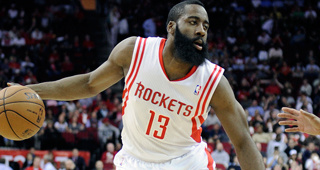With the lower seeds faring extraordinarily well, the opening games of the NBA Playoffs have triggered an ecstatic reaction from diehards, as well as from casual viewers accustomed to waiting until the Conference Finals before truly tuning in.
The NBA has entered the realm of prestige television with these playoffs, which we tend to reserve for the likes ‘Game of Thrones’, ‘True Detective’ and ‘Mad Men’.
Because of the seven-game series format, the NBA will never become event television and draw gigantic ratings like the NFL, but the level of play and excitement of these games warrants looks from the more discerning casual fan.
The first round has a level of competitive balance that is an encouraging and overlooked consequence of the NBA’s new collective bargaining agreement. While we were of course expecting increased revenues for owners, more frequent player movement and shorter title windows for the truly elite teams, the increased distribution of talent also makes the earlier rounds far more difficult for the higher seeds.
In the Western Conference, the Portland Trail Blazers are the highest seeded team currently with a series lead. Three of the four games in the Blazers’ series against the Houston Rockets have also gone into overtime.
The Rockets are basically the NBA's CBA team, due to the circumstances of how so much of its core was acquired.
James Harden, Jeremy Lin and Omer Asik were acquired via trade or free agency from teams that were either unable (Thunder) or unwilling (Knicks/Bulls) to justify the punitive tax bills associated with their new contracts.
The Knicks missed the playoffs this season in North America’s biggest market, in part due to their poor play at point guard.
Dwight Howard almost certainly re-signs with the Los Angeles Lakers if the Rockets’ option is not available to him and the world’s most popular basketball franchise may remain a playoff team even without Kobe Bryant for most of the season.
The Thunder likely are not in a dogfight against the Memphis Grizzlies if they still have Harden given their difficulties finding a third source of points.
The Washington Wizards, Toronto Raptors, Charlotte Bobcats, Dallas Mavericks and Blazers are all new playoff teams for this season. The Bobcats were the worst team in the NBA two seasons ago and hadn’t reached the playoffs since 2010. The Raptors and Wizards hadn’t been in the playoffs since 2008.
The Minnesota Timberwolves have the lonest playoff drought, not reaching the postseason since 2004, but they have one of the best individual players in the NBA in Kevin Love and ranked 11th in efficiency differential during the regular season.
The first round has been so special due to the competitiveness and closeness of the games. The first 29 games have an average point differential of 8.55, which is more than three points better than last season’s first round (11.69. The 8.55 includes a series between the Golden State Warriors and Los Angeles Clippers that is tied at 2-2, but has had margins of victories of 40 points and 21 points.
Entering Monday’s games, there have been 21 games decided by nine points or less (72 percent) and 14 games (48 percent) decided by five points or less.
The NBA expanded the first round of the playoffs from five games to seven midway through the 02-03 season, which was unquestionably triggered by the slow start by the Lakers. The Lakers ended up with the fifth seed after beginning the season with an 11-19 record after a Christmas Day loss to the Sacramento Kings.
Other than the Seattle Supersonics’ loss to the Denver Nuggets in 1994, the first round was all about mid-seed teams ceremoniously duking it out since the elite regular season teams rarely lost at all. The Chicago Bulls went 24-1 in first round games between 1991 and 1998. The Miami Heat have similarly feasted against an Eastern Conference that lacked depth, going 16-2 in the first round, but amnestying Mike Miller to save on the luxury tax could prove costly in later rounds.
The history of NBA champions is almost entirely dominated by super teams containing at least one all-time great and two or more perennial All-Stars. The 2004 Pistons and 1979 Sonics are the two biggest exceptions as teams that won while the NBA was in transition. The 2011 Mavericks had an all-time great in Dirk Nowitzki, but were a little lucky with the Heat not having yet rounded out their roster or fully figuring out how to play with each other.
Without a one-and-done format, the better team usually advances in the NBA, but we're beginning to see tangible changes in competitive balance even if the Heat go on to complete a threepeat.
Number Of First Round Games/Average Margin Of Victory/Lower Seeds Advancing
2003: 49, 10.80, 2
2004: 39, 11.95, 0
2005: 43, 11.86, 2
2006: 45, 11.40, 1
2007: 41, 10.02, 3
2008: 44, 13.39, 0
2009: 45, 13.36, 2
2010: 45, 11.16, 2
2011: 43, 8.56, 2
2012: 44, 9.73, 2
2013: 45, 11.69, 3
2014: TBD, 8.55, TBD
Number Of Series With 6 or More Games
2003: 7
2004: 1
2005: 3
2006: 6
2007: 3
2008: 4
2009: 4
2010: 5
2011: 4
2012: 4
2013: 6
2014: TBD



